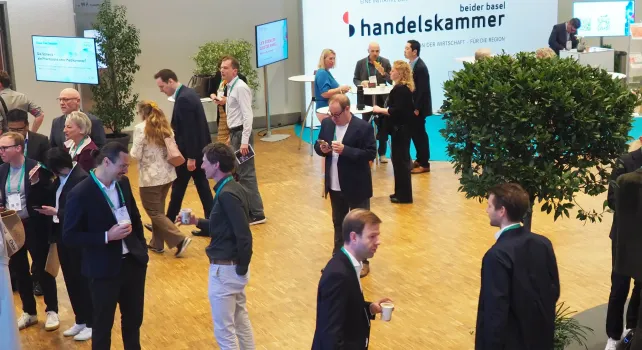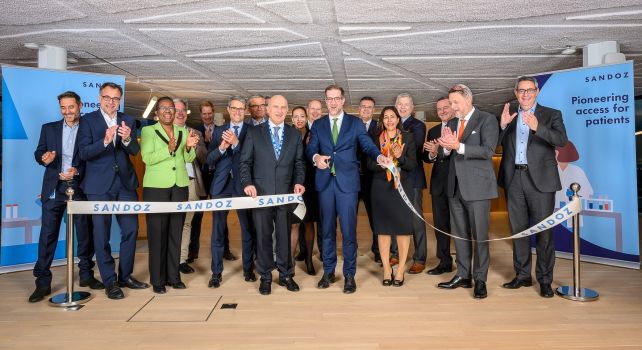«Without our corporate culture, this would not have been possible»
Despite the ongoing pandemic, several major life sciences companies have set up shop in Basel in recent months. One of them is Moderna, a U.S.-based company that is currently working hard to develop a vaccine against Covid-19. Dan Staner, Vice President and General Manager, on his first impression of Basel and Moderna's success factors in the fight against Covid-19.
Mr. Staner, what is your first impression of Basel and Switzerland as a business location?
Basel offers access to companies from the pharmaceutical, biotechnology and special ingredients markets. Those companies combine technological innovation with world-class production and process excellence. As we are growing at a very high pace, those factors were crucial when we were deciding on the location for our EMEA headquarter.
Where do you see opportunities for your company at the new Basel site - apart from the proximity to your production partner Lonza?
The pool of human talent in biotech is a critical aspect for Moderna. It allows us to attract the most talented and experienced professionals.
How did Moderna manage to develop an effective vaccine against Covid-19 in so short a time? What are the factors for success?
The breakthrough was only a matter of time. We have been developing our mRNA platform, the very foundation of this vaccine, for the past ten years – so we have yes been able to speed up some elements, but the background work has been ongoing for years, and we have been investing heavily in, research, resources and talent during that time. The speed that our mRNA platform provides is in fact one of its many benefits, including our rapid drug design technique.
One year ago, we had no manufacturing in Europe at all, and today we are delivering millions of doses from our European supply chain. A process which usually takes years, especially when starting from scratch as we have with mRNA production, we have ambitiously sped up. Without the good cooperation between authorities, regulatory agencies and biotech companies, we would not have a vaccine today.
What are Moderna's research priorities after the pandemic?
As a company, we would like to bring more products to the market. I am extremely proud of the work Moderna is doing as a growing global health innovator. The pioneering technology in our pandemic vaccine will be offered soon in other vaccines for infectious disease and therapies such as immuno-oncology. These innovations will continue to deliver benefits. In immuno-oncology we have 5 development candidates in clinical trials: two cancer vaccines and three intra-tumoral clinical programs, where we are injecting the tumors directly. Our vaccine for CMV is heading into Phase 3 trials soon, and we are hoping to launch Phase 1 trials for our first-generation flu program this year. We currently have 24 vaccines and therapeutics in development. Moderna would like to see that number at 30 or 40.
What is your personal wish in these difficult pandemic times?
I am proud that Moderna's COVID-19 vaccine is one of the early vaccines made available at an unprecedented speed and we continue working hard to end this pandemic. It is a team effort, and we are today seeing the first fruits of that labour as vaccinations are rolled out to the most vulnerable around the world. We have announced a comprehensive strategy to tackle variants, which leverages the intrinsic flexibility of our mRNA platform.
Our goal is to stay ahead of this virus and provide the tools to governments to do the same. Our decisions and next steps will be based on the data as we continue to be led by the science.
Your company is in the public eye. Many people hope that your vaccine will help to defeat the pandemic. The trust in Moderna's work, but also the expectations, are immense. How do you deal with this? How do your employees deal with it?
Since 1990, 82 viruses have been discovered that harm humans. And against these 82 viruses, there are only two approved vaccines. Thus, our work is very challenging, but also immensely rewarding. It's a privilege and an honor for all of us working at Moderna. The team are so impressive, and I am thankful for their commitment to our mission to deliver on the promise of mRNA science for patients and populations around the world.
How is that reflected in your communication and in how you manage your employees?
The pandemic forced us to work at an even higher pace than we already were working on. For this reason, we only hire the best and most talented people who bring sector experience and a lot of team spirit. Our COVID-19 vaccine is testament to that; I don't think it would have been possible without our company culture, which fosters creativity, innovation and an entrepreneurial spirit. We strive to be curious and collaborative, but also relentless and undaunted when faced with challenges – and I think this past year has proved that we are.
How do you communicate about your vaccine to the public? What are the challenges in communication?
The fear of innovation and technological progress is a big challenge and as old as humanity itself. We can't change that. But we can create transparency with the facts: The vaccine has been in clinical trials for about a year. We have tested it in more than 30,000 people of different ages, backgrounds and medical histories. Our clinical data shows a highly effective vaccine, with no serious side effects, and one that we continue to gather more data on every day. We are led by the science in the work that we do – and this science continues to give us and we hope the public, increasing amounts of confidence.





